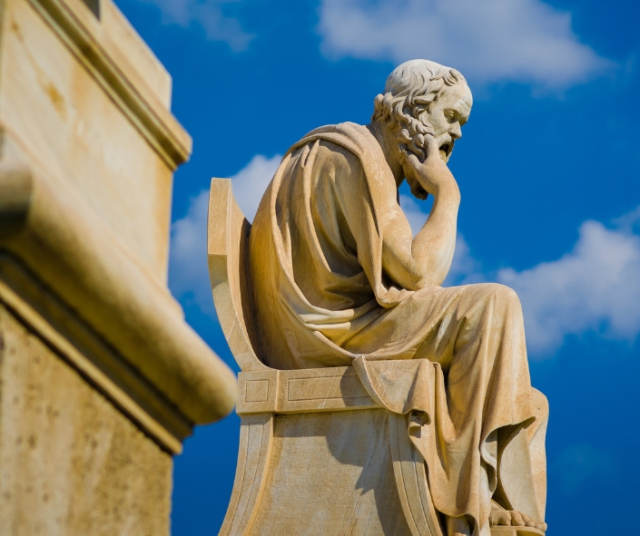Throughout history, both philosophy and psychology have tried to decipher the enigma of dreams, exploring their meaning, their possible functions and their relationship with the human mind. Join us as we delve into the depths of dreams, exploring the philosophical and psychological perspectives that have emerged over time, as well as the contemporary theories that continue to influence our understanding of this fascinating phenomenon.
Dreams in ancient philosophy.
Since ancient times, dreams have been considered messages from the gods, prophetic visions or manifestations of the soul. In classical Greece, for example, dreams were seen as divine messages that revealed the future or provided spiritual guidance. Philosophers such as Plato and Aristotle explored the meaning of dreams in their works, addressing questions such as the nature of the soul and the relationship between dreams and reality.
Plato and the allegory of the cave.
One of the most famous treatments of dreams in Western philosophy is found in the work of Plato, specifically in his "Allegory of the Cave." In this allegory, Plato compares human life to the experience of prisoners chained in a cave, seeing only shadows projected on the wall. According to Plato, everyday life is like being in the cave, while dreams represent a deeper vision of reality, a window to the world of ideas and eternal truths.
Aristotle and the theory of imagination.
Aristotle, on the other hand, developed a more scientific theory of dreams in his work "De Somnis" (On Dreams). According to Aristotle, dreams are the result of the activity of the imagination during sleep, which is a way of processing sensory impressions received during the day. From this perspective, dreams are a natural manifestation of the human mind and have no divine or prophetic meaning.
Dreams in modern philosophy.
With the advent of the modern era, the philosophical approach to dreams began to change, moving from metaphysical speculation to a more scientific and psychological approach. Philosophers such as Descartes and Kant explored the role of dreams in human experience, while thinkers such as Nietzsche and Freud developed more elaborate theories about the meaning of dreams in the human psyche.
Descartes and dreams as deception.
René Descartes, in his work "Metaphysical Meditations," argued that dreams can be deceptive and unreliable. According to Descartes, we cannot trust our senses or perceptions during dreams, since the content of dreams can be illusory and not necessarily reflect objective reality.
Kant and the nature of reality.
Immanuel Kant, on the other hand, approached dreams from an epistemological perspective in his work "Critique of Pure Reason." According to Kant, dreams are a manifestation of the human imagination and cognitive faculty, but they do not provide valid or reliable knowledge about the external world. From this perspective, dreams are a form of mental escapism, but have no relevance to the understanding of objective reality.
Dreams in psychology.
In the 20th century, psychology emerged as a separate discipline and began to develop its own theory of dreams. Influential figures such as Freud, Jung, and other psychologists explored the role of dreams in the human mind, developing theories that have profoundly influenced modern psychology and our understanding of unconscious mental processes.
Freud and the unconscious.
Sigmund Freud, the father of psychoanalysis, revolutionized our understanding of dreams by proposing that they are symbolic expressions of unconscious desires and internal conflicts. According to Freud, dreams are a way of processing and expressing repressed desires, fears and anxieties that are outside of consciousness. For Freud, dreams are the "royal path to the unconscious", and their analysis can provide valuable information about the human psyche.
Jung and the collective unconscious.
Carl Jung, a disciple of Freud and founder of analytical psychology, developed his own theory about dreams. According to Jung, dreams not only reflect individual conflicts, but are also connected to the collective unconscious, a repository of symbols and archetypes shared by all humanity. For Jung, dreams can provide access to universal aspects of the human psyche and ancient wisdom.
Hobson and McCarley's activation-synthesis theory.
In the 1970s, Allan Hobson and Robert McCarley proposed the activation-synthesis theory, which suggests that dreams are the result of random brain activity during REM (rapid eye movement) sleep. According to this theory, the brain attempts to synthesize and make sense of this random neural activity, which gives rise to the experience of dreams. From this perspective, dreams have no deep symbolic meaning, but are simply the product of brain activity during sleep.
Interpretation of dreams today.
Today, philosophical and psychological approaches to dreams continue to be the subject of debate and study. While some people believe in the importance of dreams as expressions of the unconscious and sources of personal insight, others take a more skeptical view and view dreams as mere manifestations of brain activity during sleep. Regardless of the perspective taken, dreams remain an intriguing and mysterious phenomenon that arouses the curiosity and fascination of humanity.
The practice of dream interpretation.
Throughout history, dream interpretation has been a common practice in many cultures and societies. From the ancient Egyptians to indigenous peoples, people have sought to understand the hidden meaning behind their dreams and have used different methods and techniques to interpret them. Today, dream interpretation remains a popular practice, with many people turning to books, websites, and dream experts to help them understand the content of their dreams and their possible meaning.
Throughout history, dreams have been the subject of fascination and speculation, both in philosophy and psychology. From ancient civilizations to the modern era, humans have sought to understand the meaning and nature of dreams, exploring different approaches and theories in the process. While there is no consensus on the exact meaning of dreams, it is clear that they remain an intriguing and mysterious phenomenon that arouses the curiosity and fascination of humanity.






